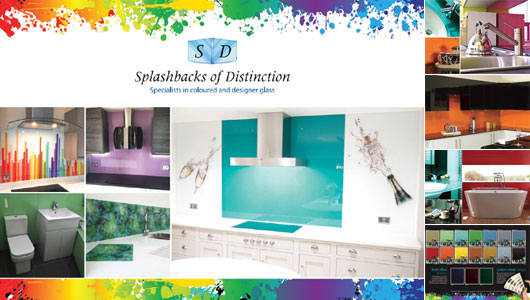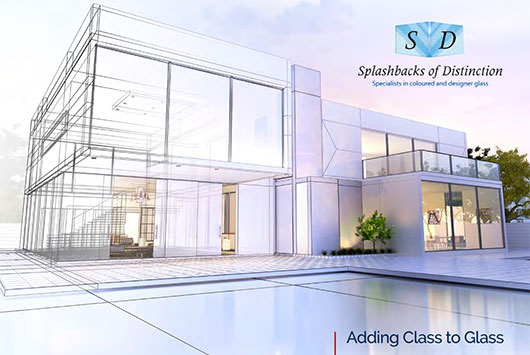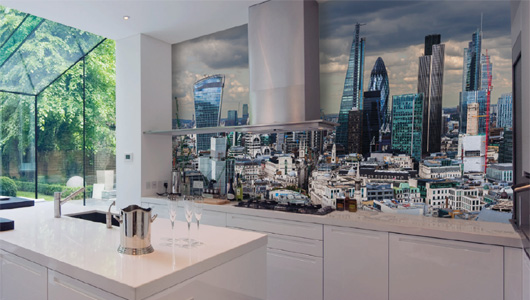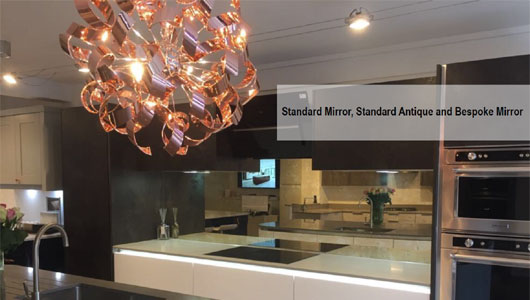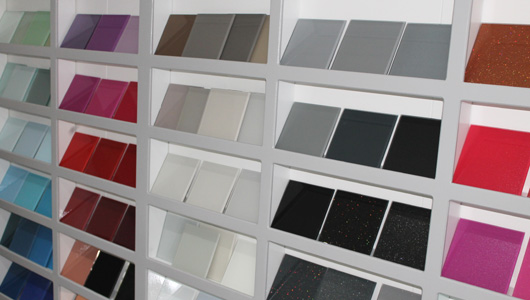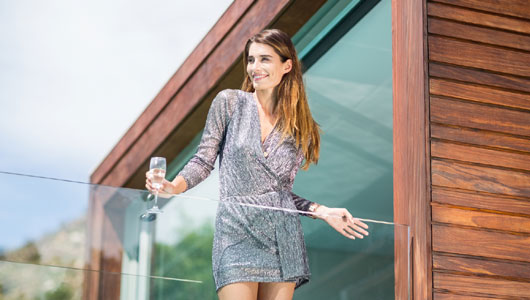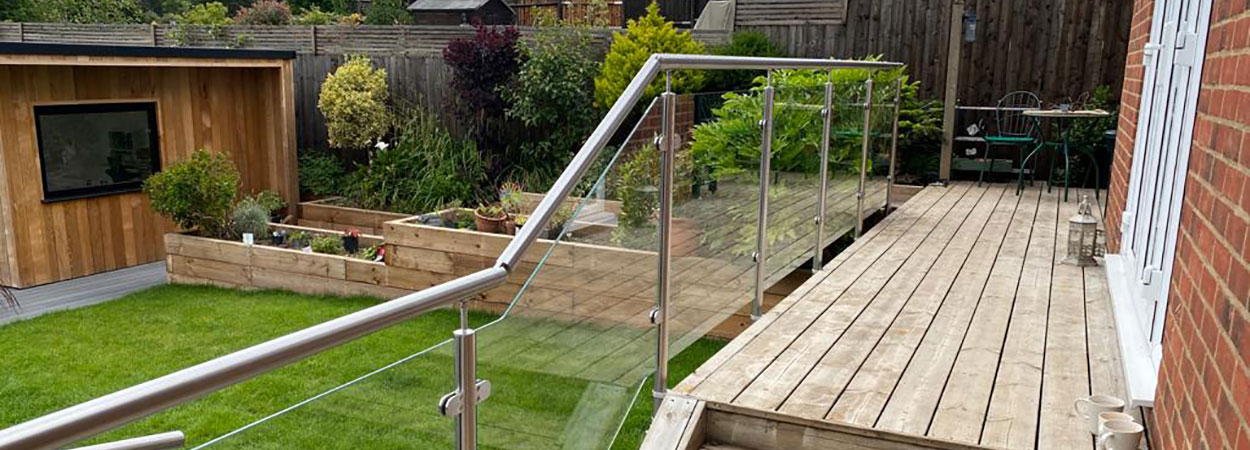
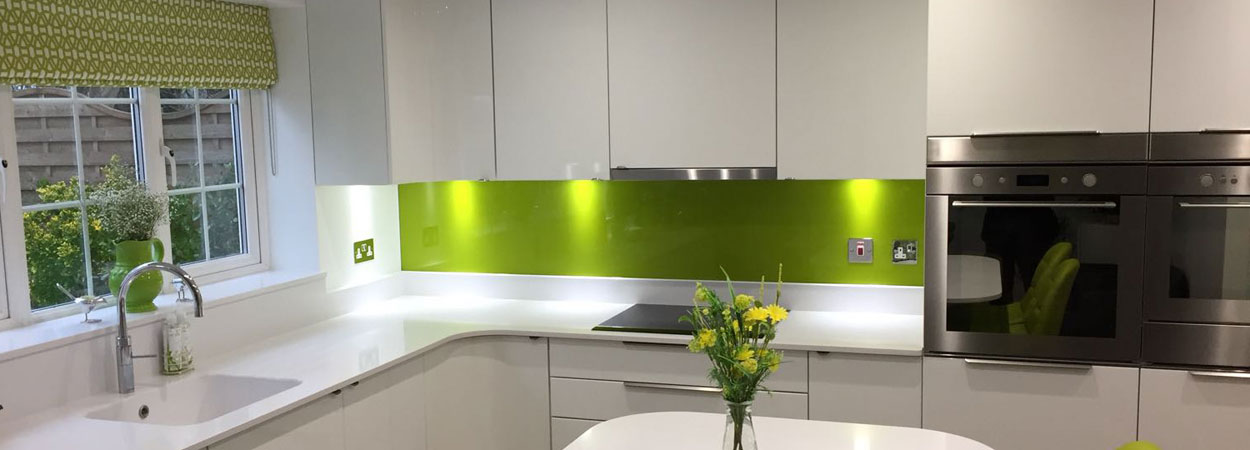
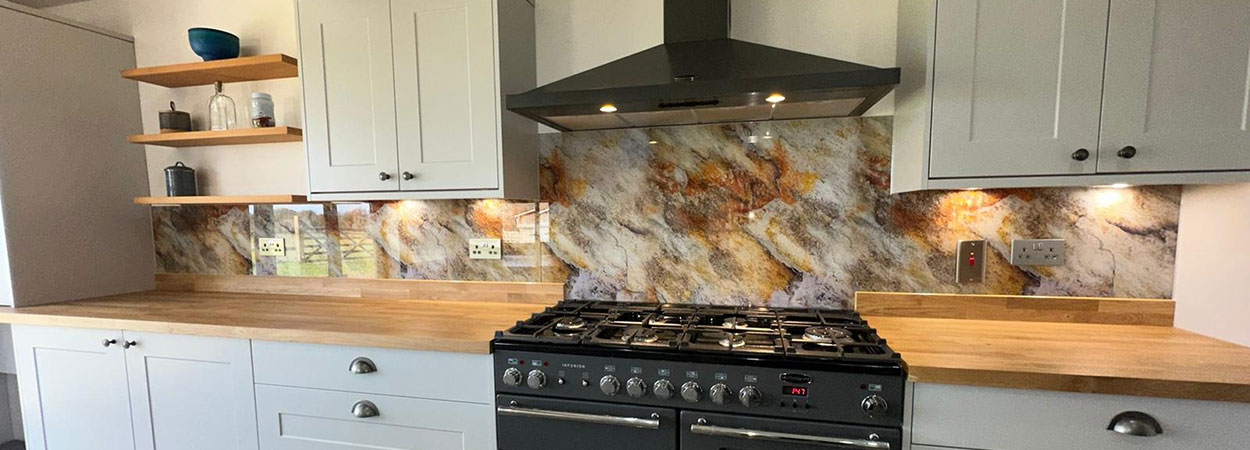
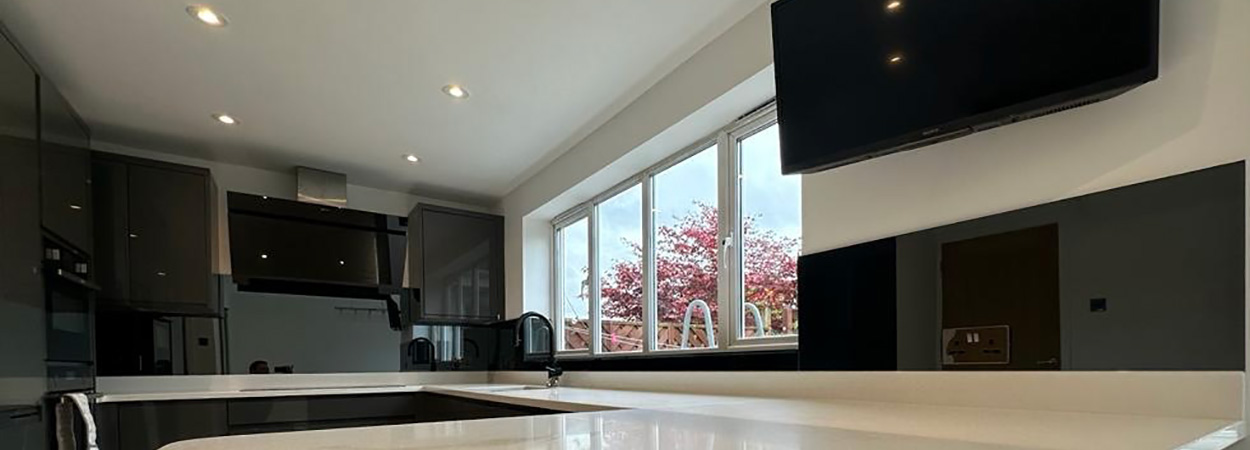
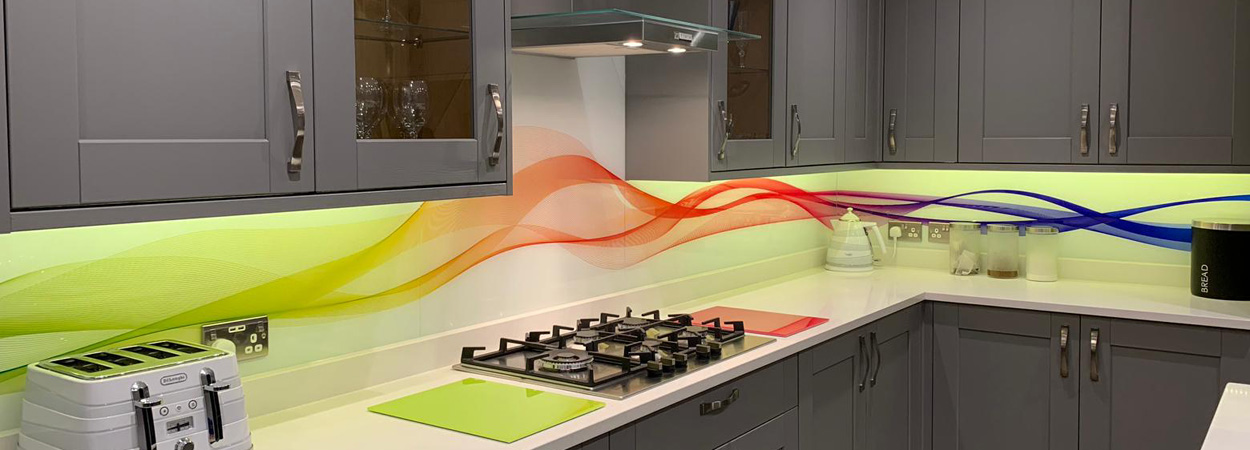
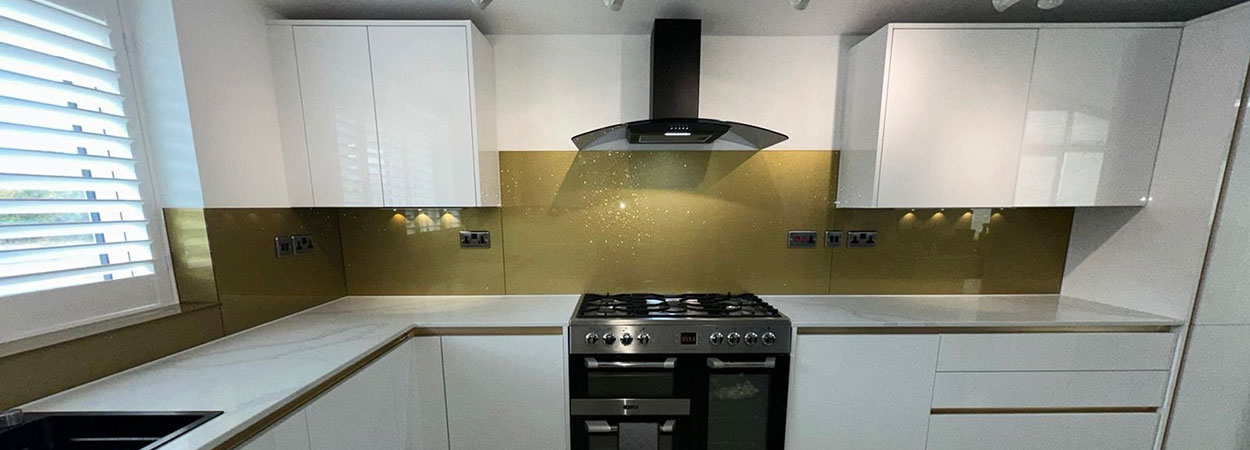


















Glass Splashbacks | Kitchen Splashbacks | Bathroom Splashbacks | Glass Balustrades | Islington, London
Based in Stevenage, Hertfordshire, Splashbacks of Distinction have a real passion for toughened glass in and around the home. We have transformed many properties, both commercial and domestic with our glass splashbacks, for kitchens, bathrooms and living rooms. Our toughened glass balustrades, glass shelving and splashbacks with high resolution images have really caught the imagination of people who demand beauty and functionality in their homes and offices.
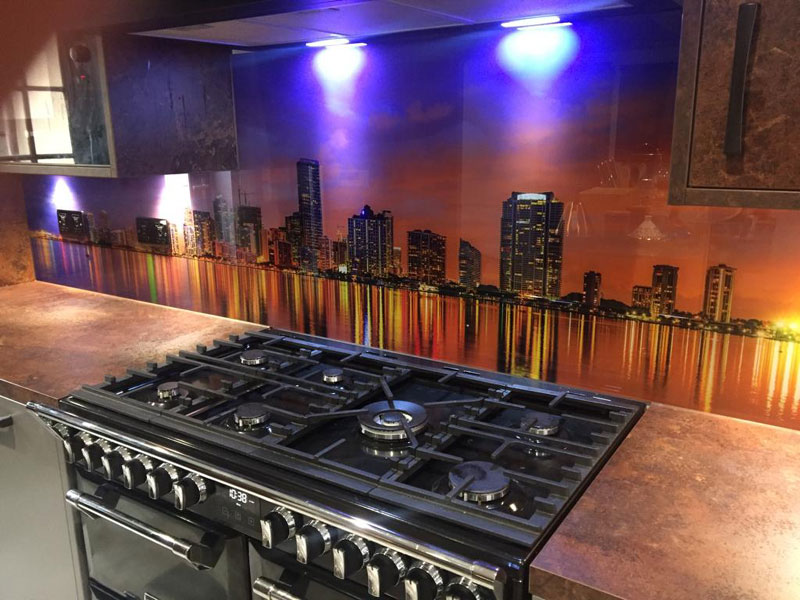
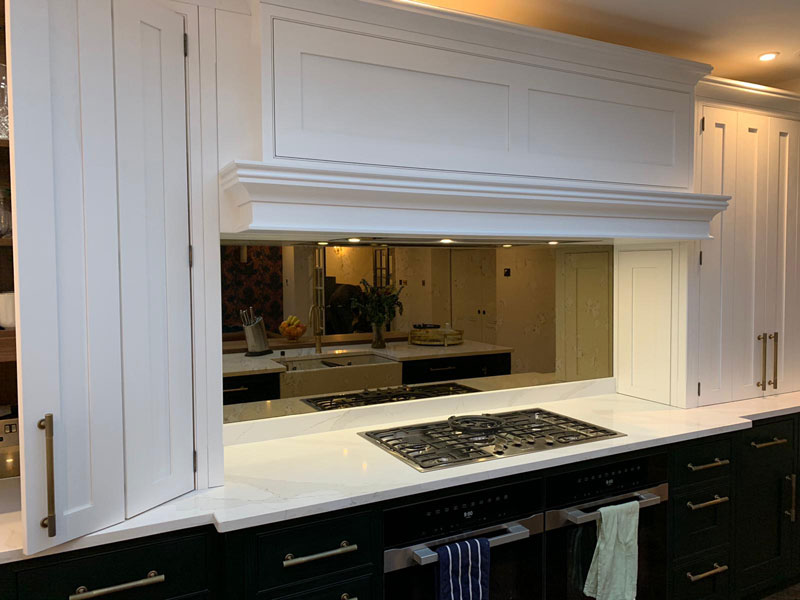
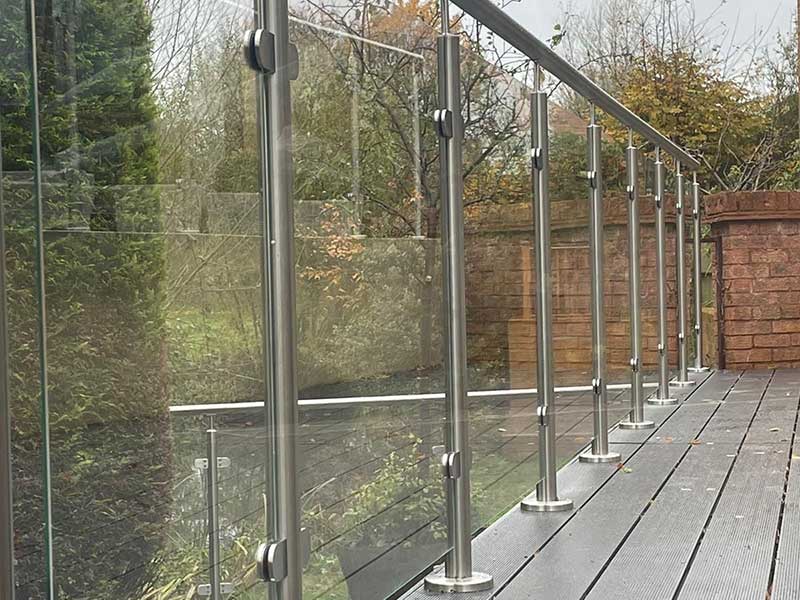
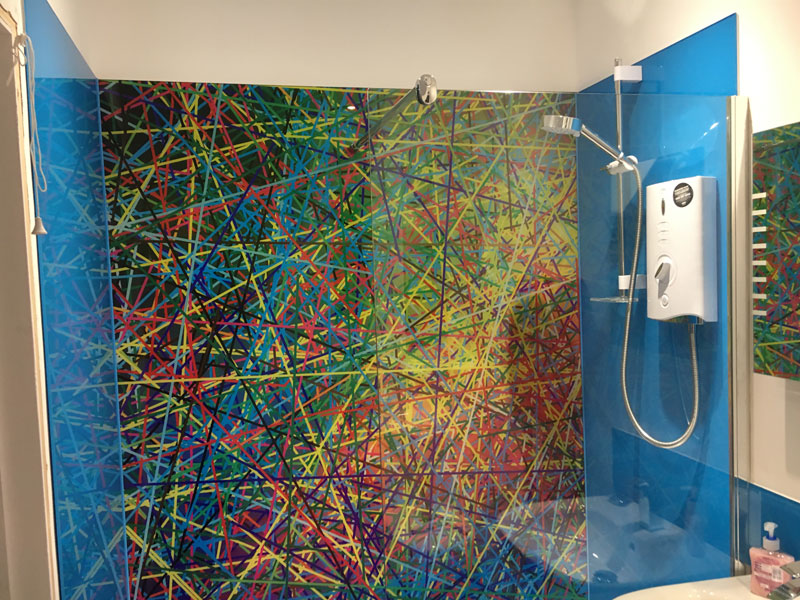
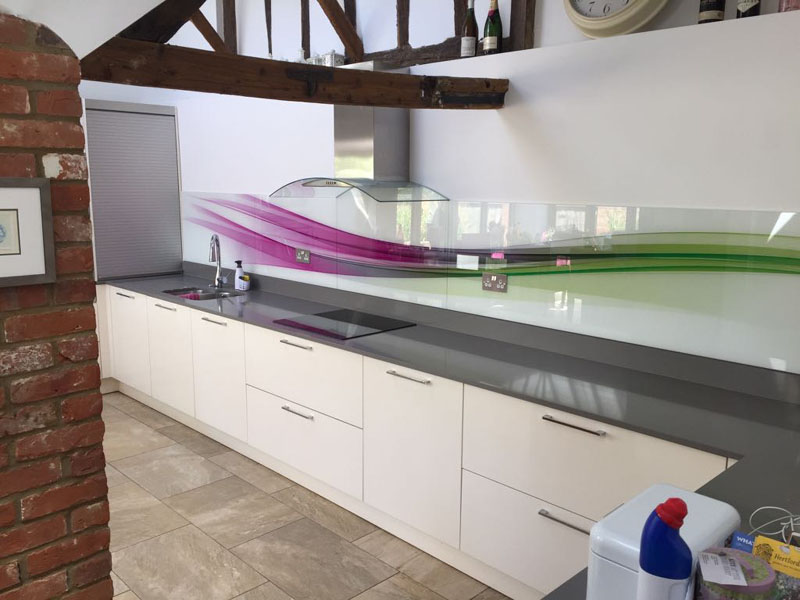
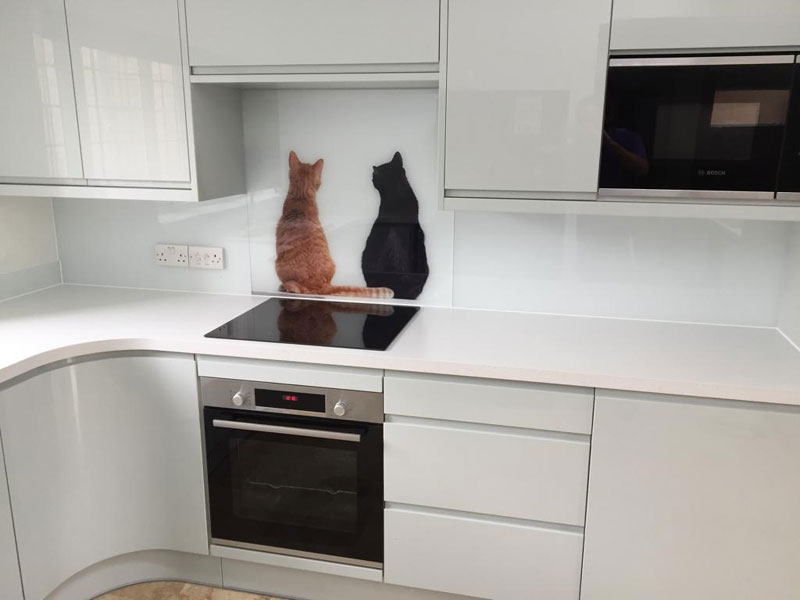
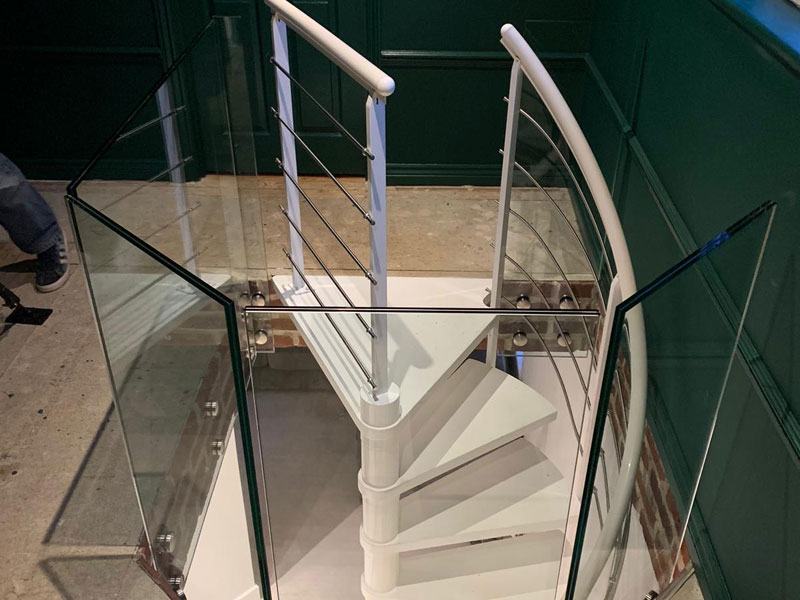
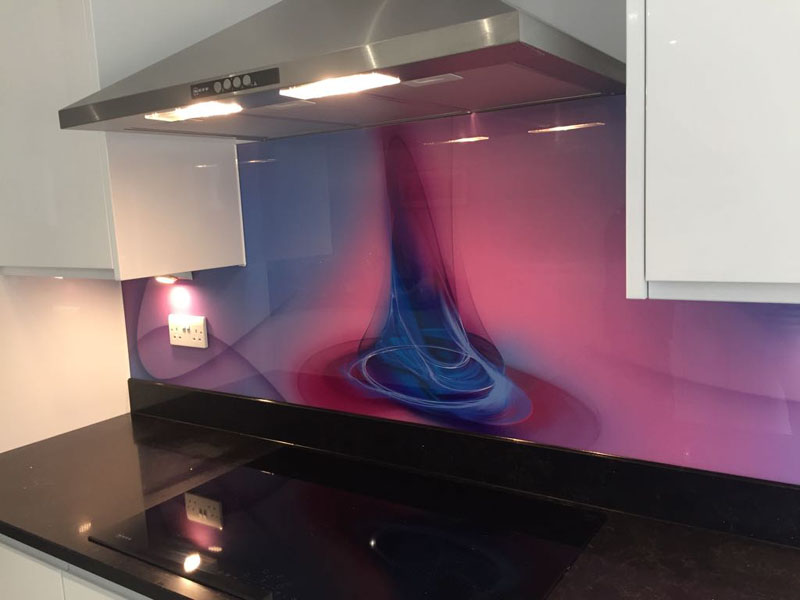
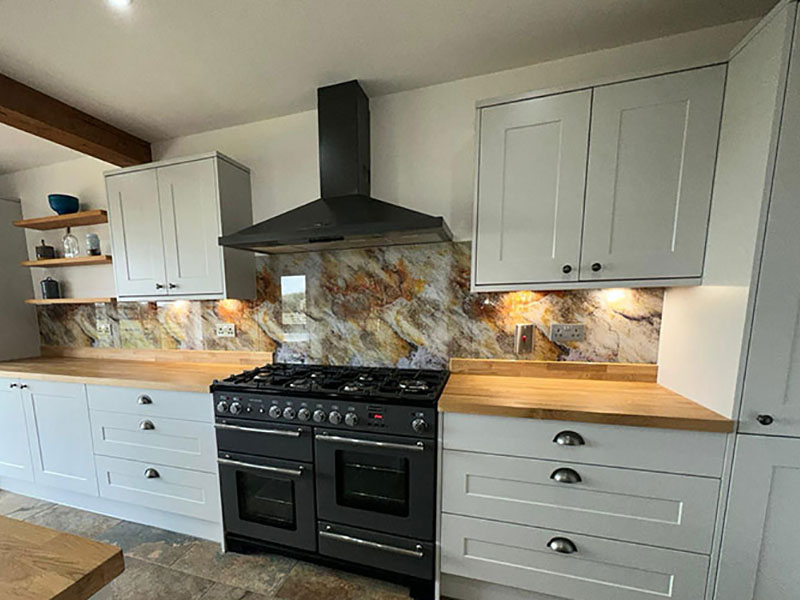
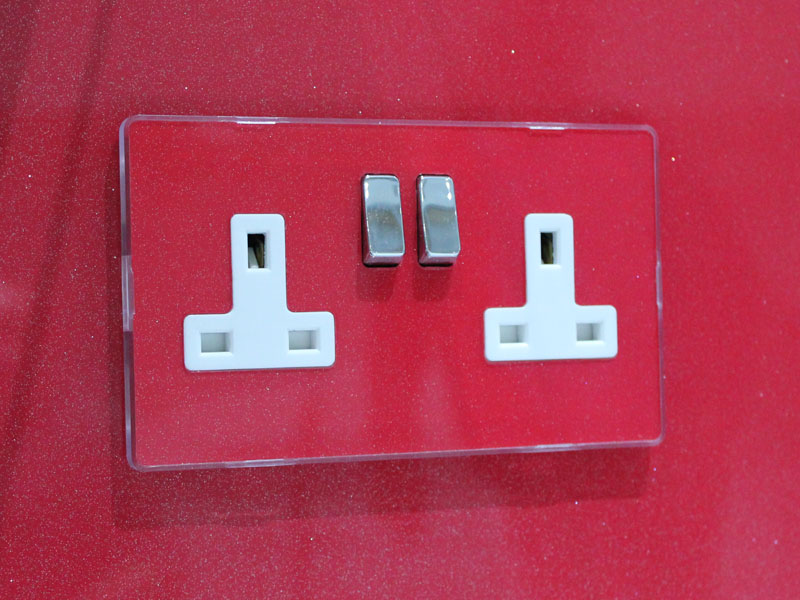


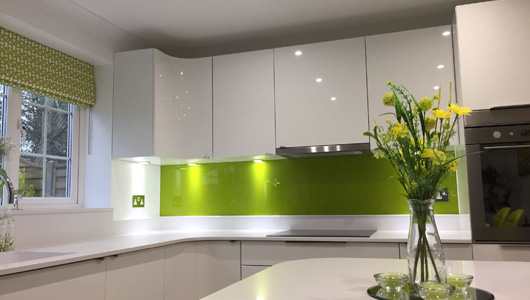
Splashbacks of Distinction
As one of the leaders in design and up to date technology, Splashbacks of Distinction are always on hand to deliver the highest standards of quality and service to our valued customers.
Splashbacks of Distinction provide a wonderful product that is suitable for kitchens, bathrooms, office spaces or anywhere you want a true touch of class.
Our splashbacks will add value and style to new and old kitchens and bathrooms. They are easy to clean and very hygienic. Every piece is toughened when manufactured so it is heat, water and impact proof.
A glass splashback and worktop will complement any bathroom, kitchen, bar area, laundry or shop. The sleek and seamless surface is the ultimate in elegance with zero visual interruption. Our glass splashbacks and worktops come in any colour and are also far easier to clean than ceramic tiles.
Should you require our services, please call or contact us by completing the simple contact form and we will get back to you as soon as possible.
Why not visit our show room or browse through our brochure
The Splashbacks of Distinction show room is located at Watton at Stone in Hertfordshire with easy access from Hertford, Stevenage and surrounding towns. It is close to both the A1 and A10 which makes it easily accessible from North London.
We have a wide range of samples, styles, colours and textures for you to see and touch. Our clients have told us that being able to visit our showroom really helps them to visualise and develop their ideas so that they really end up with exactly what they wanted. Our workshop is next to the showroom so you can also see our products as they are manufactured.
Hertfordshire Showroom Details
We have also created a stunning brochure with a selection from our range. This is available to download as a PDF by clicking on the link below.
Adding class to glass with our glass balustrades
Glass creates an illusion of more space and allows outside features to become part of the interior design. With glass it is possible to link two different spaces together without the barrier of a wall giving you the ability to enjoy your home and garden throughout the year.
Our frameless systems create a contemporary design which safely maximises any view, allowing natural light to spread across the living space. This solution can be used for internal stairs, external balconies, or to act as windbreaks in exposed areas outdoors.
Balustrade posts provide a classic, yet still very popular, design choice. Manufactured using 2.6mm thick walled, 48mm stainless steel for superior strength. This high quality, external grade steel maximises durability and minimises maintenance.
Glass spigots create a modern, minimalist design choice which maximises your view. Glass spigots are a large glass floor clamp that secures the glass vertically. The individual 'feet' allow for natural drainage making it an ideal choice for external areas including patio, and decked gardens, as well as poolside areas.
Massive range of printed splashbacks
The possibilities are almost endless. Whether you wish to modernise your home or office space, enhance it or create an eye-catching element in one of your rooms we are here to make your dream come true. Your wish is our command.
Perhaps a tropical landscape in the bathroom? How about a stylish banister or wall art? Or even a state-of-the art room divider?
If you own a business you might want to create a new inviting atmosphere for your customers or upgrade your existing space, making it uniquely stylish.
At Splashbacks of Distinction we can even recreate different surface patterns too. That wood-style surface you always wanted is now possible and it comes with all the advantages of glass. Our customers also love our granite and marble styles which are perfectly stunning.
NEW range of glass mirrors
When it comes to Mirrors, in either a Kitchen or Bathroom, nothing quite rivals the open, light and clean look that such a simple product offers.
Splashbacks of Distinction offer a range of standard mirrors available in Silver, Grey, Bronze and Peach with toughened options available.
Our bespoke antique mirrors offer depth and character, reflecting the beauty of its surroundings as well as enhancing them. Our collection of six unique mirrors can bring depth, glamour and a unique look to any space.
Choose from our range of antique mirror styles including moon, lava, mercury, Neptune, vincenzo, bronze vincenzo and bianco nero. Why not view our brochure or contact us today to see what we can do for you.
We can supply samples to help you choose
It is often very difficult to see what a particular colour or finish will look like from a picture. We understand that and can supply samples of your chosen splash back to enable you to get the best possible idea of what your dream kitchen or bathroom will look like before it is fitted.
We already have hundreds of samples available to look at in our showroom including different types of finishes such as glitter or sparkle. We can supply a sample in any colour or finish you would like from our extensive range.
Our splash backs are often so vibrant that it is very difficult to really appreciate them from a simple image and with some finishes, such as the mirrored finishes, it is virtually impossible. With a sample you can get a much clearer idea of how your splash back will look in your kitchen and how it will compliment the other colours and textures around it.
A complete service from measuring to final installation
At Splashbacks of Distinction we carefully manage the complete production, design and fitting of our bespoke, designer glass splashbacks.
Great care is taken to measure the intended space and our team will discuss your requirements and help with any ideas you have. Once we have finalised your design with our team, Splashbacks of Distinction can start to make the magic happen.
At every stage of the production process each of our panels is quality checked. Once one of our panels has left our workshop, we at Splashbacks of Distinction transport it and install it. Because each design is unique, it requires specialist knowledge to ensure correct fitting. Our team of experienced fitters will ensure that the panels are correctly aligned and mounted. We won't be happy until our customer is completely happy with the result.
Our team will work closely with you to create your dream design, ensuring the highest quality from start to finish so you can look forward to the magnificent result. We take pride in maintaining the highest of standards so that you, our customer can enjoy the beauty of our bespoke products.
The highest levels of safety and quality as standard
All of our glass splashbacks and panels are made using toughened glass. The glass is processed in accordance with the requirements of the relevant British and European quality standards BS EN 12150 : 2000 (Impact Tested BS EN 12600 : 2000).
You can rest assured that our glass splashbacks are safe and of the highest quality. Splashbacks of Distinction carries out rigorous checks to ensure that each panel is of the highest standard. At Splashbacks of Distinction we make sure that every panel is correctly aligned and fitted. Our toughened glass splashbacks are made to withstand daily use and will provide you with a strong, durable surface whilst maintaining their wonderful appeal and elegance. Reflecting natural light and brightening up dark corners, the splashbacks create an inviting, vibrant atmosphere.
Whether as a wall in a shower, as a room divider or a banister, our toughened glass will not let you down. It provides an excellent sealed barrier in kitchens and bathrooms where steam can cause havoc to walls and plaster.
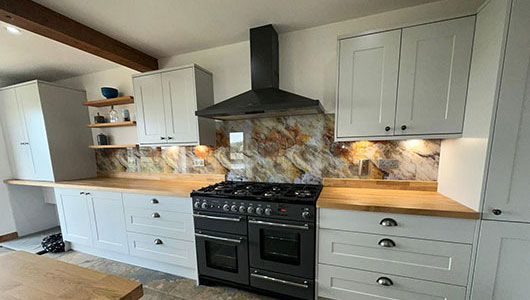
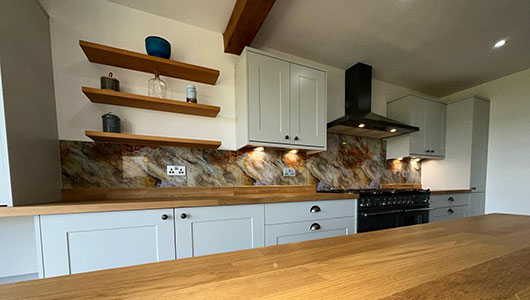
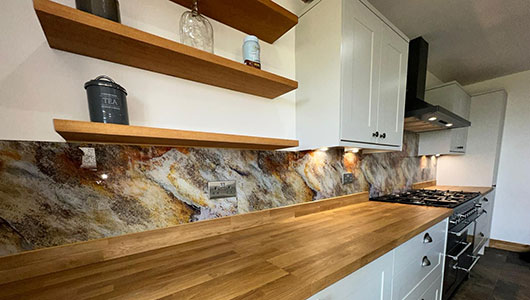
Wonderful customer service
I felt you really cared that we got the best effect for our kitchen and were happy to help us work through the options for as long as it took. Wonderful customer service and the splashback looks great.
(Kitchen splashback using design 010 from our own range)
Mrs Crawford, Aston”
Glass splashbacks in Islington
Splashbacks of Distinction are a family run, professional business that is based in Stevenage, Hertfordshire. We cover a wide area, supplying and fitting many different types of glass products and offer many premium glass related services.
Splashbacks of Distinction are happy to visit your Islington property to discuss any glass project you may have. We can help with advice, supply and fitting of your new glass splashback or other glass products.
A little about Islington
Islington was originally named by the Saxons Giseldone in about 1005, then Gislandune in 1062. The name means Gislas hill from the Old English personal name Gisla and dun hill, down. The name then later mutated to Isledon, which remained in use well into the 17th century when the modern form arose.
In medieval times, Islington was just one of many small manors in the area, along with Bernersbury, Neweton Berewe or Hey bury, and Canonesbury. Islington came to be applied as the name for the parish covering these villages, and was the name chosen for the Metropolitan Borough of Islington, on its formation in 1899. On the merger with Finsbury, to form the modern borough this name came to be applied to the whole borough.
Market gardens and entertainments in Islington
In the 17th and 18th centuries the availability of water made Islington a great place for growing vegetables to feed the ever growing London area. The manor at Islington became a popular excursion destination for Londoners, attracted to the area by its rural feel. Many public houses were therefore built to serve the needs of both the excursionists and travellers on the turnpike. By 1716, there were fifty six ale-house keepers in Upper Street, also offering pleasure and tea gardens, and activities such as archery, skittle alleys and bowling. By the 18th century, music and dancing were offered, together with billiards, firework displays and balloon flights.
The King's Head Tavern, now a Victorian building with a theatre, has remained on the same site, opposite the Islington parish church, since 1543. The founder of the theatre, Dan Crawford, who died in 2005, disagreed with the introduction of decimal coinage. For twenty-plus years after decimalisation, the bar continued to show prices and charge for drinks in pre-decimalisation currency.
By the 19th century many music halls and theatres were established around Islington Green. One such was Collins's Music Hall, the remains of which are now partly incorporated into a bookshop. The remainder of the Hall has been redeveloped into a new theatre, with its entrance at the bottom of Essex Road. It stood on the site of the Landsdowne Tavern, where the landlord had built an entertainment room for customers who wanted to sing. It was founded in 1862 by Samuel Thomas Collins Vagg and by 1897 had become a 1,800-seat theatre with ten bars. The theatre suffered damage in a fire in 1958 and has not reopened. Between 92 and 162 acts were put on each evening and celebrated performers who started there included Marie Lloyd, George Robey, Harry Lauder, Harry Tate, George Formby, Vesta Tilley, Tommy Trinder, Gracie Fields, Tommy Handley and Norman Wisdom.
An Academy of excellence for Islington
The Islington Literary and Scientific Society was established in 1833 and first met in Mr. Edgeworth's Academy on Upper Street. Its goal was to spread knowledge through lectures, discussions, and experiments, politics and theology being forbidden. A building, the Literary and Scientific Institution, was erected in 1837 in Wellington Street, designed by Roumieu and Gough in a stuccoed Grecian style. It included a library reading room, museum, laboratory, and lecture theatre that were able to seat five hundred. The subscription was two guineas a year. After the Islington library was sold off in 1872, the building was sold or leased in 1874 to the Wellington Club, which occupied it until 1886. In 1885 the hall was used for concerts, balls, and public meetings. The Salvation Army bought the building in 1890, renamed it the Wellington Castle barracks, and remained there until 1955. The building became a factory and showroom for Beck's British Carnival Novelties for a few years from 1956, after which it stood empty. In 1978 a campaign began with the goal to redevelop the building as a theatre. A public appeal was launched in 1981, and a festival of avant-garde theatre and music was held there and at other Islington venues in 1982. What has become the successful Almeida Theatre was founded.
The borough of Islington includes the following areas:
- Angel
- Archway
- Barnsbury
- Canonbury
- Clerkenwell
- Farringdon
- Finsbury
- Finsbury Park
- Highbury
- Highgate
- Holloway
- Islington
- Kings Cross
- Lower Holloway
- Nags Head
- Mildmay
- Newington Green
- Old Street
- Pentonville
- St Lukes
- Tufnell Park
- Upper Holloway
Splashbacks of Distinction supply the following splashback products in Islington, London
- Glass kitchen splashbacks
- Glass kitchen splashback samples
- Glass kitchen splashbacks in many different colours
- Printed glass splashbacks
- Colour matched splashbacks
- Painted splashbacks
Splashbacks of Distinction also supply the following glass products in Islington, London
- Stainless steel and glass Balustrades
- Glass shelves
- Coloured mirrors
- Toughened mirrors
- Decorative glass
- Glass hardware
- Glass worktops
- Glass shower cubicle
- Garden glass balustrades
- Glass staircases
- Glass table tops
- Satin glass
- Toughened glass
- Laminated glass
- Opaque glass
Splashbacks of Distinction also supply the following glass related services in Islington, London
- Glass cut to size
- Mirrors cut to size while you wait
- Glass processing
- Glass supply and installation
- Supply only splashbacks
- A glass express service
- Template and fit
Only the finest quality from Splashbacks of Distinction
Splashbacks of Distinction ensure that only the finest quality toughened glass is used in all our products. We guarantee all of our work and are fully insured. We employ only trained and certified engineers. Splashbacks of Distinction never leave your property without ensuring you are totally satisfied with your beautiful new glass splashback, baluster, shelving or shower enclosure.
Further Information
If you would like to know more or are interested in a quote we would be happy to help. Phone us on 01920 830 084, email us at enquiries@splashbacksofdistinction.co.uk or fill in our enquiry form and we will be in touch as soon as possible.
Areas covered in London:
- Arkley, London - Kitchen splashbacks | Bathroom splashbacks | Splashbacks with High Resolution Pictures | Glass Balustrades | Glass Shelves | Bespoke Mirrors | Bespoke Shower Screens and Enclosures | Acrylic Splashbacks | Glass splashbacks | Glass Worktops
- Barnet, London - Kitchen splashbacks | Bathroom splashbacks | Splashbacks with High Resolution Pictures | Glass Balustrades | Glass Shelves | Bespoke Mirrors | Bespoke Shower Screens and Enclosures | Acrylic Splashbacks | Glass splashbacks | Glass Worktops
- Battersea, London - Kitchen splashbacks | Bathroom splashbacks | Splashbacks with High Resolution Pictures | Glass Balustrades | Glass Shelves | Bespoke Mirrors | Bespoke Shower Screens and Enclosures | Acrylic Splashbacks | Glass splashbacks | Glass Worktops
- Beckton, London - Kitchen splashbacks | Bathroom splashbacks | Splashbacks with High Resolution Pictures | Glass Balustrades | Glass Shelves | Bespoke Mirrors | Bespoke Shower Screens and Enclosures | Acrylic Splashbacks | Glass splashbacks | Glass Worktops
- Bermondsey, London - Kitchen splashbacks | Bathroom splashbacks | Splashbacks with High Resolution Pictures | Glass Balustrades | Glass Shelves | Bespoke Mirrors | Bespoke Shower Screens and Enclosures | Acrylic Splashbacks | Glass splashbacks | Glass Worktops
- Bethnal Green, London - Kitchen splashbacks | Bathroom splashbacks | Splashbacks with High Resolution Pictures | Glass Balustrades | Glass Shelves | Bespoke Mirrors | Bespoke Shower Screens and Enclosures | Acrylic Splashbacks | Glass splashbacks | Glass Worktops
- Bexley, London - Kitchen splashbacks | Bathroom splashbacks | Splashbacks with High Resolution Pictures | Glass Balustrades | Glass Shelves | Bespoke Mirrors | Bespoke Shower Screens and Enclosures | Acrylic Splashbacks | Glass splashbacks | Glass Worktops
- Bexley Heath, London - Kitchen splashbacks | Bathroom splashbacks | Splashbacks with High Resolution Pictures | Glass Balustrades | Glass Shelves | Bespoke Mirrors | Bespoke Shower Screens and Enclosures | Acrylic Splashbacks | Glass splashbacks | Glass Worktops
- Blackheath, London - Kitchen splashbacks | Bathroom splashbacks | Splashbacks with High Resolution Pictures | Glass Balustrades | Glass Shelves | Bespoke Mirrors | Bespoke Shower Screens and Enclosures | Acrylic Splashbacks | Glass splashbacks | Glass Worktops
- Bow, London - Kitchen splashbacks | Bathroom splashbacks | Splashbacks with High Resolution Pictures | Glass Balustrades | Glass Shelves | Bespoke Mirrors | Bespoke Shower Screens and Enclosures | Acrylic Splashbacks | Glass splashbacks | Glass Worktops
- Brixton, London - Kitchen splashbacks | Bathroom splashbacks | Splashbacks with High Resolution Pictures | Glass Balustrades | Glass Shelves | Bespoke Mirrors | Bespoke Shower Screens and Enclosures | Acrylic Splashbacks | Glass splashbacks | Glass Worktops
- Bromley, London - Kitchen splashbacks | Bathroom splashbacks | Splashbacks with High Resolution Pictures | Glass Balustrades | Glass Shelves | Bespoke Mirrors | Bespoke Shower Screens and Enclosures | Acrylic Splashbacks | Glass splashbacks | Glass Worktops
- Buckhurst Hill, London - Kitchen splashbacks | Bathroom splashbacks | Splashbacks with High Resolution Pictures | Glass Balustrades | Glass Shelves | Bespoke Mirrors | Bespoke Shower Screens and Enclosures | Acrylic Splashbacks | Glass splashbacks | Glass Worktops
- Camberwell, London - Kitchen splashbacks | Bathroom splashbacks | Splashbacks with High Resolution Pictures | Glass Balustrades | Glass Shelves | Bespoke Mirrors | Bespoke Shower Screens and Enclosures | Acrylic Splashbacks | Glass splashbacks | Glass Worktops
- Camden, London - Kitchen splashbacks | Bathroom splashbacks | Splashbacks with High Resolution Pictures | Glass Balustrades | Glass Shelves | Bespoke Mirrors | Bespoke Shower Screens and Enclosures | Acrylic Splashbacks | Glass splashbacks | Glass Worktops
- Chadwell Heath, London - Kitchen splashbacks | Bathroom splashbacks | Splashbacks with High Resolution Pictures | Glass Balustrades | Glass Shelves | Bespoke Mirrors | Bespoke Shower Screens and Enclosures | Acrylic Splashbacks | Glass splashbacks | Glass Worktops
- Chigwell, London - Kitchen splashbacks | Bathroom splashbacks | Splashbacks with High Resolution Pictures | Glass Balustrades | Glass Shelves | Bespoke Mirrors | Bespoke Shower Screens and Enclosures | Acrylic Splashbacks | Glass splashbacks | Glass Worktops
- Chelsea, London - Kitchen splashbacks | Bathroom splashbacks | Splashbacks with High Resolution Pictures | Glass Balustrades | Glass Shelves | Bespoke Mirrors | Bespoke Shower Screens and Enclosures | Acrylic Splashbacks | Glass splashbacks | Glass Worktops
- Chingford, London - Kitchen splashbacks | Bathroom splashbacks | Splashbacks with High Resolution Pictures | Glass Balustrades | Glass Shelves | Bespoke Mirrors | Bespoke Shower Screens and Enclosures | Acrylic Splashbacks | Glass splashbacks | Glass Worktops
- Clapham, London - Kitchen splashbacks | Bathroom splashbacks | Splashbacks with High Resolution Pictures | Glass Balustrades | Glass Shelves | Bespoke Mirrors | Bespoke Shower Screens and Enclosures | Acrylic Splashbacks | Glass splashbacks | Glass Worktops
- Clapton, London - Kitchen splashbacks | Bathroom splashbacks | Splashbacks with High Resolution Pictures | Glass Balustrades | Glass Shelves | Bespoke Mirrors | Bespoke Shower Screens and Enclosures | Acrylic Splashbacks | Glass splashbacks | Glass Worktops
- Crayford, London - Kitchen splashbacks | Bathroom splashbacks | Splashbacks with High Resolution Pictures | Glass Balustrades | Glass Shelves | Bespoke Mirrors | Bespoke Shower Screens and Enclosures | Acrylic Splashbacks | Glass splashbacks | Glass Worktops
- Croydon, London - Kitchen splashbacks | Bathroom splashbacks | Splashbacks with High Resolution Pictures | Glass Balustrades | Glass Shelves | Bespoke Mirrors | Bespoke Shower Screens and Enclosures | Acrylic Splashbacks | Glass splashbacks | Glass Worktops
- Crystal Palace, London - Kitchen splashbacks | Bathroom splashbacks | Splashbacks with High Resolution Pictures | Glass Balustrades | Glass Shelves | Bespoke Mirrors | Bespoke Shower Screens and Enclosures | Acrylic Splashbacks | Glass splashbacks | Glass Worktops
- Dartford, London - Kitchen splashbacks | Bathroom splashbacks | Splashbacks with High Resolution Pictures | Glass Balustrades | Glass Shelves | Bespoke Mirrors | Bespoke Shower Screens and Enclosures | Acrylic Splashbacks | Glass splashbacks | Glass Worktops
- Dulwich, London - Kitchen splashbacks | Bathroom splashbacks | Splashbacks with High Resolution Pictures | Glass Balustrades | Glass Shelves | Bespoke Mirrors | Bespoke Shower Screens and Enclosures | Acrylic Splashbacks | Glass splashbacks | Glass Worktops
- Elm Park, London - Kitchen splashbacks | Bathroom splashbacks | Splashbacks with High Resolution Pictures | Glass Balustrades | Glass Shelves | Bespoke Mirrors | Bespoke Shower Screens and Enclosures | Acrylic Splashbacks | Glass splashbacks | Glass Worktops
- Eltham, London - Kitchen splashbacks | Bathroom splashbacks | Splashbacks with High Resolution Pictures | Glass Balustrades | Glass Shelves | Bespoke Mirrors | Bespoke Shower Screens and Enclosures | Acrylic Splashbacks | Glass splashbacks | Glass Worktops
- Enfield, London - Kitchen splashbacks | Bathroom splashbacks | Splashbacks with High Resolution Pictures | Glass Balustrades | Glass Shelves | Bespoke Mirrors | Bespoke Shower Screens and Enclosures | Acrylic Splashbacks | Glass splashbacks | Glass Worktops
- Finchley, London - Kitchen splashbacks | Bathroom splashbacks | Splashbacks with High Resolution Pictures | Glass Balustrades | Glass Shelves | Bespoke Mirrors | Bespoke Shower Screens and Enclosures | Acrylic Splashbacks | Glass splashbacks | Glass Worktops
- Fulham, London - Kitchen splashbacks | Bathroom splashbacks | Splashbacks with High Resolution Pictures | Glass Balustrades | Glass Shelves | Bespoke Mirrors | Bespoke Shower Screens and Enclosures | Acrylic Splashbacks | Glass splashbacks | Glass Worktops
- Greenford, London - Kitchen splashbacks | Bathroom splashbacks | Splashbacks with High Resolution Pictures | Glass Balustrades | Glass Shelves | Bespoke Mirrors | Bespoke Shower Screens and Enclosures | Acrylic Splashbacks | Glass splashbacks | Glass Worktops
- Greenwich, London - Kitchen splashbacks | Bathroom splashbacks | Splashbacks with High Resolution Pictures | Glass Balustrades | Glass Shelves | Bespoke Mirrors | Bespoke Shower Screens and Enclosures | Acrylic Splashbacks | Glass splashbacks | Glass Worktops
- Hackney, London - Kitchen splashbacks | Bathroom splashbacks | Splashbacks with High Resolution Pictures | Glass Balustrades | Glass Shelves | Bespoke Mirrors | Bespoke Shower Screens and Enclosures | Acrylic Splashbacks | Glass splashbacks | Glass Worktops
- Hadley Wood, London - Kitchen splashbacks | Bathroom splashbacks | Splashbacks with High Resolution Pictures | Glass Balustrades | Glass Shelves | Bespoke Mirrors | Bespoke Shower Screens and Enclosures | Acrylic Splashbacks | Glass splashbacks | Glass Worktops
- Hammersmith, London - Kitchen splashbacks | Bathroom splashbacks | Splashbacks with High Resolution Pictures | Glass Balustrades | Glass Shelves | Bespoke Mirrors | Bespoke Shower Screens and Enclosures | Acrylic Splashbacks | Glass splashbacks | Glass Worktops
- Hampstead, London - Kitchen splashbacks | Bathroom splashbacks | Splashbacks with High Resolution Pictures | Glass Balustrades | Glass Shelves | Bespoke Mirrors | Bespoke Shower Screens and Enclosures | Acrylic Splashbacks | Glass splashbacks | Glass Worktops
- Harold Wood, London - Kitchen splashbacks | Bathroom splashbacks | Splashbacks with High Resolution Pictures | Glass Balustrades | Glass Shelves | Bespoke Mirrors | Bespoke Shower Screens and Enclosures | Acrylic Splashbacks | Glass splashbacks | Glass Worktops
- Harrow, London - Kitchen splashbacks | Bathroom splashbacks | Splashbacks with High Resolution Pictures | Glass Balustrades | Glass Shelves | Bespoke Mirrors | Bespoke Shower Screens and Enclosures | Acrylic Splashbacks | Glass splashbacks | Glass Worktops
- Havering, London - Kitchen splashbacks | Bathroom splashbacks | Splashbacks with High Resolution Pictures | Glass Balustrades | Glass Shelves | Bespoke Mirrors | Bespoke Shower Screens and Enclosures | Acrylic Splashbacks | Glass splashbacks | Glass Worktops
- Hendon, London - Kitchen splashbacks | Bathroom splashbacks | Splashbacks with High Resolution Pictures | Glass Balustrades | Glass Shelves | Bespoke Mirrors | Bespoke Shower Screens and Enclosures | Acrylic Splashbacks | Glass splashbacks | Glass Worktops
- Highams Park, London - Kitchen splashbacks | Bathroom splashbacks | Splashbacks with High Resolution Pictures | Glass Balustrades | Glass Shelves | Bespoke Mirrors | Bespoke Shower Screens and Enclosures | Acrylic Splashbacks | Glass splashbacks | Glass Worktops
- Highgate, London - Kitchen splashbacks | Bathroom splashbacks | Splashbacks with High Resolution Pictures | Glass Balustrades | Glass Shelves | Bespoke Mirrors | Bespoke Shower Screens and Enclosures | Acrylic Splashbacks | Glass splashbacks | Glass Worktops
- Hillingdon, London - Kitchen splashbacks | Bathroom splashbacks | Splashbacks with High Resolution Pictures | Glass Balustrades | Glass Shelves | Bespoke Mirrors | Bespoke Shower Screens and Enclosures | Acrylic Splashbacks | Glass splashbacks | Glass Worktops
- Hornchurch, London - Kitchen splashbacks | Bathroom splashbacks | Splashbacks with High Resolution Pictures | Glass Balustrades | Glass Shelves | Bespoke Mirrors | Bespoke Shower Screens and Enclosures | Acrylic Splashbacks | Glass splashbacks | Glass Worktops
- Hounslow, London - Kitchen splashbacks | Bathroom splashbacks | Splashbacks with High Resolution Pictures | Glass Balustrades | Glass Shelves | Bespoke Mirrors | Bespoke Shower Screens and Enclosures | Acrylic Splashbacks | Glass splashbacks | Glass Worktops
- Ilford, London - Kitchen splashbacks | Bathroom splashbacks | Splashbacks with High Resolution Pictures | Glass Balustrades | Glass Shelves | Bespoke Mirrors | Bespoke Shower Screens and Enclosures | Acrylic Splashbacks | Glass splashbacks | Glass Worktops
- Kensington, London - Kitchen splashbacks | Bathroom splashbacks | Splashbacks with High Resolution Pictures | Glass Balustrades | Glass Shelves | Bespoke Mirrors | Bespoke Shower Screens and Enclosures | Acrylic Splashbacks | Glass splashbacks | Glass Worktops
- Lewisham, London - Kitchen splashbacks | Bathroom splashbacks | Splashbacks with High Resolution Pictures | Glass Balustrades | Glass Shelves | Bespoke Mirrors | Bespoke Shower Screens and Enclosures | Acrylic Splashbacks | Glass splashbacks | Glass Worktops
- Loughton, London - Kitchen splashbacks | Bathroom splashbacks | Splashbacks with High Resolution Pictures | Glass Balustrades | Glass Shelves | Bespoke Mirrors | Bespoke Shower Screens and Enclosures | Acrylic Splashbacks | Glass splashbacks | Glass Worktops
- Mill Hill, London - Kitchen splashbacks | Bathroom splashbacks | Splashbacks with High Resolution Pictures | Glass Balustrades | Glass Shelves | Bespoke Mirrors | Bespoke Shower Screens and Enclosures | Acrylic Splashbacks | Glass splashbacks | Glass Worktops
- Mitcham, London - Kitchen splashbacks | Bathroom splashbacks | Splashbacks with High Resolution Pictures | Glass Balustrades | Glass Shelves | Bespoke Mirrors | Bespoke Shower Screens and Enclosures | Acrylic Splashbacks | Glass splashbacks | Glass Worktops
- Mortlake, London - Kitchen splashbacks | Bathroom splashbacks | Splashbacks with High Resolution Pictures | Glass Balustrades | Glass Shelves | Bespoke Mirrors | Bespoke Shower Screens and Enclosures | Acrylic Splashbacks | Glass splashbacks | Glass Worktops
- Northolt, London - Kitchen splashbacks | Bathroom splashbacks | Splashbacks with High Resolution Pictures | Glass Balustrades | Glass Shelves | Bespoke Mirrors | Bespoke Shower Screens and Enclosures | Acrylic Splashbacks | Glass splashbacks | Glass Worktops
- Notting Hill, London - Kitchen splashbacks | Bathroom splashbacks | Splashbacks with High Resolution Pictures | Glass Balustrades | Glass Shelves | Bespoke Mirrors | Bespoke Shower Screens and Enclosures | Acrylic Splashbacks | Glass splashbacks | Glass Worktops
- Peckham, London - Kitchen splashbacks | Bathroom splashbacks | Splashbacks with High Resolution Pictures | Glass Balustrades | Glass Shelves | Bespoke Mirrors | Bespoke Shower Screens and Enclosures | Acrylic Splashbacks | Glass splashbacks | Glass Worktops
- Penge, London - Kitchen splashbacks | Bathroom splashbacks | Splashbacks with High Resolution Pictures | Glass Balustrades | Glass Shelves | Bespoke Mirrors | Bespoke Shower Screens and Enclosures | Acrylic Splashbacks | Glass splashbacks | Glass Worktops
- Pinner, London - Kitchen splashbacks | Bathroom splashbacks | Splashbacks with High Resolution Pictures | Glass Balustrades | Glass Shelves | Bespoke Mirrors | Bespoke Shower Screens and Enclosures | Acrylic Splashbacks | Glass splashbacks | Glass Worktops
- Poplar, London - Kitchen splashbacks | Bathroom splashbacks | Splashbacks with High Resolution Pictures | Glass Balustrades | Glass Shelves | Bespoke Mirrors | Bespoke Shower Screens and Enclosures | Acrylic Splashbacks | Glass splashbacks | Glass Worktops
- Richmond, London - Kitchen splashbacks | Bathroom splashbacks | Splashbacks with High Resolution Pictures | Glass Balustrades | Glass Shelves | Bespoke Mirrors | Bespoke Shower Screens and Enclosures | Acrylic Splashbacks | Glass splashbacks | Glass Worktops
- Romford, London - Kitchen splashbacks | Bathroom splashbacks | Splashbacks with High Resolution Pictures | Glass Balustrades | Glass Shelves | Bespoke Mirrors | Bespoke Shower Screens and Enclosures | Acrylic Splashbacks | Glass splashbacks | Glass Worktops
- Ruislip, London - Kitchen splashbacks | Bathroom splashbacks | Splashbacks with High Resolution Pictures | Glass Balustrades | Glass Shelves | Bespoke Mirrors | Bespoke Shower Screens and Enclosures | Acrylic Splashbacks | Glass splashbacks | Glass Worktops
- St Johns Wood, London - Kitchen splashbacks | Bathroom splashbacks | Splashbacks with High Resolution Pictures | Glass Balustrades | Glass Shelves | Bespoke Mirrors | Bespoke Shower Screens and Enclosures | Acrylic Splashbacks | Glass splashbacks | Glass Worktops
- Streatham, London - Kitchen splashbacks | Bathroom splashbacks | Splashbacks with High Resolution Pictures | Glass Balustrades | Glass Shelves | Bespoke Mirrors | Bespoke Shower Screens and Enclosures | Acrylic Splashbacks | Glass splashbacks | Glass Worktops
- Sydenham, London - Kitchen splashbacks | Bathroom splashbacks | Splashbacks with High Resolution Pictures | Glass Balustrades | Glass Shelves | Bespoke Mirrors | Bespoke Shower Screens and Enclosures | Acrylic Splashbacks | Glass splashbacks | Glass Worktops
- Teddington, London - Kitchen splashbacks | Bathroom splashbacks | Splashbacks with High Resolution Pictures | Glass Balustrades | Glass Shelves | Bespoke Mirrors | Bespoke Shower Screens and Enclosures | Acrylic Splashbacks | Glass splashbacks | Glass Worktops
- Tooting, London - Kitchen splashbacks | Bathroom splashbacks | Splashbacks with High Resolution Pictures | Glass Balustrades | Glass Shelves | Bespoke Mirrors | Bespoke Shower Screens and Enclosures | Acrylic Splashbacks | Glass splashbacks | Glass Worktops
- Tottenham, London - Kitchen splashbacks | Bathroom splashbacks | Splashbacks with High Resolution Pictures | Glass Balustrades | Glass Shelves | Bespoke Mirrors | Bespoke Shower Screens and Enclosures | Acrylic Splashbacks | Glass splashbacks | Glass Worktops
- Twickenham, London - Kitchen splashbacks | Bathroom splashbacks | Splashbacks with High Resolution Pictures | Glass Balustrades | Glass Shelves | Bespoke Mirrors | Bespoke Shower Screens and Enclosures | Acrylic Splashbacks | Glass splashbacks | Glass Worktops
- Upminster, London - Kitchen splashbacks | Bathroom splashbacks | Splashbacks with High Resolution Pictures | Glass Balustrades | Glass Shelves | Bespoke Mirrors | Bespoke Shower Screens and Enclosures | Acrylic Splashbacks | Glass splashbacks | Glass Worktops
- Uxbridge, London - Kitchen splashbacks | Bathroom splashbacks | Splashbacks with High Resolution Pictures | Glass Balustrades | Glass Shelves | Bespoke Mirrors | Bespoke Shower Screens and Enclosures | Acrylic Splashbacks | Glass splashbacks | Glass Worktops
- Waltham Forest, London - Kitchen splashbacks | Bathroom splashbacks | Splashbacks with High Resolution Pictures | Glass Balustrades | Glass Shelves | Bespoke Mirrors | Bespoke Shower Screens and Enclosures | Acrylic Splashbacks | Glass splashbacks | Glass Worktops
- West Norwood, London - Kitchen splashbacks | Bathroom splashbacks | Splashbacks with High Resolution Pictures | Glass Balustrades | Glass Shelves | Bespoke Mirrors | Bespoke Shower Screens and Enclosures | Acrylic Splashbacks | Glass splashbacks | Glass Worktops
- Wimbledon, London - Kitchen splashbacks | Bathroom splashbacks | Splashbacks with High Resolution Pictures | Glass Balustrades | Glass Shelves | Bespoke Mirrors | Bespoke Shower Screens and Enclosures | Acrylic Splashbacks | Glass splashbacks | Glass Worktops
- Worcester Park, London - Kitchen splashbacks | Bathroom splashbacks | Splashbacks with High Resolution Pictures | Glass Balustrades | Glass Shelves | Bespoke Mirrors | Bespoke Shower Screens and Enclosures | Acrylic Splashbacks | Glass splashbacks | Glass Worktops

Showroom: Unit 11, Broomhall Farm, Watton At Stone, Hertford SG14 2RN
Splashbacks of Distinction is the trading name of RDC Glass Ltd







